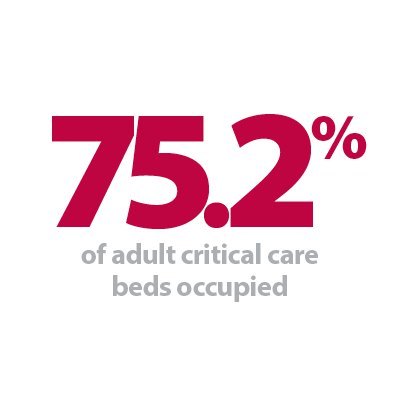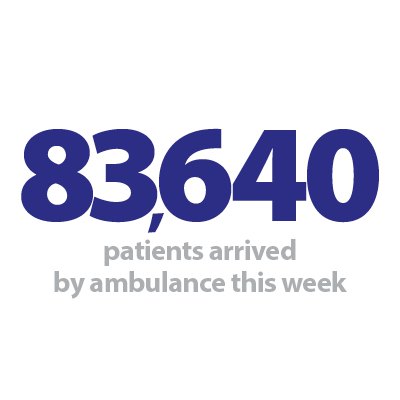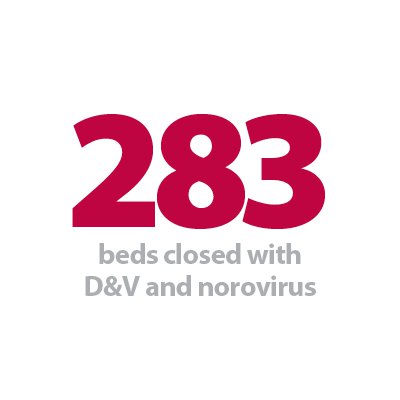


Today we saw the fifth week of the winter sitreps published by NHS England and NHS Improvement. The latest developments in the COVID-19 pandemic continue to impact the NHS and the ongoing surge in cases associated with the rapid spread of the Omicron variant remains of key concern to trust leaders and their staff.
Recent data (6 January) show over 150,000 cases in England alone, an increase of about 4% since the week before, and the number of patients in hospital reached over 2,000, 40% more than the week prior. Staff absences, particularly due to COVID-19, have also increased since the previous week, with the latest data (27 December to 2 January) showing over 80,000 staff absences, of which almost half (44%) were COVID-19 related. This picture was particularly evident in the north west and the north east and Yorkshire, which saw increases of 122% and 129% in COVID-19 staff absences, respectively.
On this fifth week of our NHS Winter Watch campaign, data highlight the ongoing pressures trusts are facing as the Omicron wave continues.
Key headlines from winter sit reps (27 December – 2 January)
- Pressures continue in the ambulance services with 83,640 patients arriving by ambulance this week, 639 more than the week before.
- Ambulance handover delays increased this week too, with 22.5% of patients being delayed by 30 minutes or more (19,099 patients or 2,728 patients per day) and 9.9% being delayed by 60 minutes or more. Both figures are higher than this time last year.
- A&E diverts increased slightly to 21 but remain similar to this time last year.
- Adult critical bed occupancy is currently at its lowest level since the start of this winter's sitreps (75.2%), and lower than this time last year (79.5%), as well as compared to two years ago (82.4%).
- General and acute bed occupancy is slightly up this week at 88.5%.
- Paediatric intensive care bed occupancy has decreased to 75.1% but remains higher than this time last year, whereas neonatal intensive care bed occupancy increased slightly to 68% and it too remains higher than last year.
- We continue to see more patients staying in hospital longer than seven, 15 and 21 days, with figures increasing since the week before (2.6%, 2.8% and 5.4%, respectively) and up from the ones observed this time one year ago (by 12.3%, 18.5% and 27.5%, respectively).
- The number of beds closed with diarrhoea and vomiting (D&V) and norovirus has increased this week (283). Despite being now lower than two weeks before (318) this figure is considerably higher than one year ago (50).
- An average of 16,906 critical care and COVID-19 patients no longer met the criteria to reside in hospital in the latest week. Of these, 9,858 (58.3%) remained in hospital.
These figures highlight how busy trusts are at the moment, balancing the challenging winter pressures with staff shortages and the effects of the Omicron variant. This week we observed ongoing demand, particularly in ambulance services, with increased arrivals and high proportions of handover delays.
Despite relatively stable bed occupancy rates and some decreases in adult critical bed occupancy and paediatric intensive care bed occupancy, bed occupancy remains high. Trusts continue to seek to balance COVID-19 patient care in the context of extremely challenging workforce constraints due to sickness levels and vacancy rates. As in recent weeks, we are seeing more patients staying in hospital for longer, as well as considerably higher numbers of beds closed with D&V compared to the year before.
Over the Christmas period, Omicron's highly contagious nature led to a steep increase in infections, which were reflected in growing numbers of patients in hospital across the country, particularly in London but now starting to surge in the north and other parts of the country as well. Alongside the concerning workforce shortages, NHS staff are also diligently delivering high numbers of life-saving booster jabs and vaccinations, with 63% of those aged 12 and over having received a booster shot already in England.
These challenges will undoubtedly continue to be felt throughout the winter months, resulting in an unprecedented level of pressure for the NHS.
Alder Hey Children's NHS Foundation Trust
Alder Hey Children's NHS Foundation Trust chief operating officer, Adam Bateman, discusses his organisation's response to helping tackle a surge in children and young people from Merseyside and Cheshire requiring urgent and emergency care.
At Alder Hey we have responded to a huge surge in children and young people requiring urgent and emergency care. Our staff have worked in unrelenting circumstances. We have seen teams and individuals across the trust come together to provide the best possible care for the children and young people of Merseyside and Cheshire.
Real team-working across the trust
We have deployed acute paediatric slots within clinics to support a direct review from specialties from our emergency department (ED); a seven-day service for the health visitor stream. Our senior clinicians are delivering a primary care streaming service (known colloquially as 'doctor in a box') and daily rapid assessment and treatment.
Innovation and ingenuity
To address unprecedent demand we have launched a digital symptom checker for children. This online platform is supporting parents, carers and young people with advice to support self-care where appropriate and signposting to the right service.
We are using technology to drive our continuous monitoring of where we are and what we expect there is to come. Our live capacity and situational reports are enabling us to match resources, including staffing, to where patient need is greatest.
Partnership working to improve urgent care to children and young people across the region
Through our paediatric network and paediatric gold command we have mobilised new regional services and mutual aid plans between locally partnered paediatric departments. This includes a paediatric clinical assessment service offering virtual appointments with paediatric specialists to patients triaged via NHS 111, an important alternative to ED. A dedicated paediatric transport service is facilitating mutual aid and helping to utilise paediatric ward capacity across the region and avoid extreme pressures.
Finally, and most importantly, our award-winning staff wellbeing services are providing emotional and psychological support to staff
Our Staff Advice Support Service (SALS), with professional, full-time psychologists working daily to identify and support individuals in dire need. We provided to our staff free hot food, hot drinks and encouraged breaks. We are expanding this significantly with "SALS patient advice and liaison service" who will be individuals across Alder Hey wiling and trained to step up in localised support of their colleagues in need.
In ED we have an ED wellbeing team helping deliver team time, ground truth, and drop in psychology sessions. These sessions feed into the senior team to understand what small changes we can make to support them. We have brought the Wingman lounge – a respite break offer run by grounded flight crews – into ED as well as other wellbeing initiatives such as the massage van. There is a bespoke "wellbeing room" within the ED for when staff need a time out from the pressure of the department.
It continues to be busy, with 'normal' winter pressures exacerbated by the pandemic, but with creativity underlined by a genuine commitment to each other and our children, young people and families, we're getting through.
Health service grappling with a huge array of challenges
Responding to the latest winter reporting data from NHS England and NHS Improvement, the chief executive of NHS Providers, Chris Hopson said:
"These figures demonstrate the continued pressure trusts are under as Omicron continues to tighten its grip.
"The most immediate challenge is that 80,000 staff are now absent from work, with almost half due to COVID-19 sickness or self-isolation. Rising staff absences – amid a backdrop of 100,000 staff vacancies which pre-dated the pandemic – are making a tough job even tougher.
"In London, trust leaders will welcome the support from the armed forces to help address this staffing crisis. Across the country, trusts who are currently planning for further growth in Omicron infection rates and hospital attendance will also be keeping a close eye on the need for additional support as staffing shortages bite.
"The urgent and emergency pathway continues to be under particular pressure, with a significant increase in ambulance handover delays into busy emergency departments this week, and more people calling 111 for care.
"Meanwhile, trust leaders will feel reassured that the number of beds in hospital occupied by patients remains stable, although at levels above what we would expect to see.
"However, this week has posed a new challenge as many care homes have now had to close their doors to new admissions due to rising levels of COVID-19. This means that despite the best efforts of health and care staff, we can expect to see more delayed discharges from hospitals, making it more difficult to admit patients and a potential deterioration in patient outcomes.
"At the same time, trusts are also continuing to address a significant backlog of planned care and delivering the ongoing vaccination programme.
"This all adds up to a picture of unprecedented pressure for the NHS, so we need realism about what can be achieved and how quickly as the health service grapples with this huge array of challenges."